With Chicago QB Caleb Williams set to sign the first BILLION dollar contract in NFL history, I felt this article was topical.
Originally posted in April 2024.
Updated March 2025.
In 2008, wide receiver Terrell Owens exclaimed, "that's my quarterback," during a tearful press conference after the No. 1 seed Cowboys lost to the New York Giants, 21-17, in the divisional round. Owens was referring to Tony Romo, who has been criticized for a taking a vacation to Cabo San Lucas during the bye week prior to the Cowboy’s playoff game with the Giants.
“If you do that, that’s really unfair,” Owens said. “Really unfair. That’s my teammate. That’s my quarterback. We lost as a team. We lost as a team, man.”
As a team.
Most of you who follow me know that I am big fan of Tom Brady. Tom Brady help lead the Michigan Wolverines to the 1997 College National Football Championship. He then played in the NFL for 20+ years, won 7 Super Bowls and played in 3 more. He sits a top just about ever meaningful record a QB can have and is the undisputed GOAT for NFL quarterbacks.
So what does this have to do with healthcare in Canada?
I recently saw a tweet showing the career earnings for Tom Brady and former Michigan Spartan QB Kirk Cousins.
Seems odd no? While Kirk Cousins has had a decent career, he certainly has not had the same success and productivity that Brady has. Yet somehow Cousins who has played seven less seasons will earn nearly ~$80 million more over his career.
I then asked Microsoft AI Pilot to compare the two QBs:
First, we must understand how the NFL pays players. Each team has a salary cap. It is a fixed amount teams can pay their 53 man roster. The more you pay one player, the less you have to pay others.
Since the year 2000, quarterback salaries in the NFL have seen significant growth. Let’s delve into the data:
In 2024, NFL teams allocate an average of 10.1% of their salary cap to quarterbacks.
Here is Tom Brady’s contact history, including his share of the salary cap:
And here is Kirk Cousin’s contract history to compare:
Tom Brady was always close to the league average of 10%, often below, while Cousins was consistently well over the 10% average share of his team’s salary cap (we can exclude the first 4 years as these are rookie contracts that have prescribed amounts based on when players were drafted).
The success of QBs is contingent on many other players. They need an offensive line to protect them. A wide receiver or tight end to catch their passes. A running back to carry the ball and gain tough but valuable years. A defence to stymy the other teams offence. Special teams to kick field goals/PATs as well as punt for field position.
Clearly, football is a team sport that requires all members of the team to work together towards a common goal: winning the game.
Quarterbacks are an important part of this team dynamic.
Some quarterbacks are comprehensive. That means they can “do it all.” They can pass but also run the ball. They lead the team. The offense runs through them.
A great example of a comprehensive QB is Patrick Mahomes. Although not in the GOAT conversation yet, Mahomes can make just about any pass asked of him, can run as well as any running back and is a dual threat whenever he is on the field. He is the face of the franchise and takes a leadership role in the locker room.
Some QBs are “game managers.” They make short but safe passes. They rarely run the ball. Their job is manage the game and let stars at the other positions win the game.
Kirk Cousins is a bit of a game manager in my opinion.
Mark Sanchez is also great example of a game manager. Sanchez bounced around the NFL from team to team. He played seven seasons in the NFL with stops in Philadelphia, Dallas, Washington and New York. His stats were never very great.
Let’s further explore the world of “game manager” quarterbacks to see who have achieved Super Bowl glory. Only 3 QBs have ever led a team to a Super Bowl victory.
Trent Dilfer: Dilfer is the epitome of a “game manager.” He played for several teams and was known for his conservative style. In the 2000 season, he led the Baltimore Ravens to a Super Bowl victory, relying heavily on their dominant defense.1
Jim McMahon: McMahon, while not putting up gaudy numbers, contributed just enough to help his teams. He famously won a Super Bowl with the Chicago Bears, even though his career-high touchdown count was a modest 151
Peyton Manning: Yes, even the legendary Peyton Manning transitioned into a game manager role in his final season with the Denver Broncos. At age 39, he won his second championship, relying on a strong defense to secure the Super Bowl victory2.
Which brings me back to the comparison between Brady and Cousins. Brady took less because he realized that to succeed as a team, he needed to consume less of the fixed pie to make sure he was surrounded by the best possible talent in order to succeed.
Cousins, on the other hand, has taken the maximum amount of money and term offered to him at every contract. While he has had personal success, it is clear that his team success is nowhere near what Brady accomplished with his team-oriented approach.
Both men have earned enough during their careers to be comfortable. Both men have insured the financial security of their families.
So, what does this have to do with health care in Canada?
The biggest difference between Brady and Cousins is the success of their teams.
The difference is experience and outcomes.
I have previously written about the importance of teams. Teams in healthcare are the life blood of a successful and sustainable healthcare system. Healthcare teams include physicians, nurses, nurse practitioners, personal support workers, pharmacists, technicians and many, many others.
Paragraph 25 of the Ontario Physician Services Binding Arbitration Framework (BAF) includes two very important criteria:
Both QBs were well paid. Fair and reasonable. Of that there is no question.
Tom Brady was never the highest paid quarterback but he was certainly the most successful. Ever.
Kirk Cousins made a lot of money but he won but a single playoff game in his career.
“Patient-centered” means putting experience and outcomes over incomes.
Interesting, don’t you think?
And then there is Josh Allen.
This is why Josh Allen is the 2024 NFL MVP.
Which brings us to the “Butt Fumble.”
The infamous Butt Fumble is a moment etched in football history.
In a New York Jets game, quarterback Mark Sanchez found himself in an unfortunate situation. As he dropped back to pass, he collided with his own offensive lineman’s rear end (yes, you read that right!). The collision caused Sanchez to fumble the ball, and to make matters worse, the opposing team recovered it and returned it for a touchdown.
There is a lesson to be learned here.
Economics in healthcare matters.
What we pay for and what we get in return matters. Intentions cannot replace outcomes.
Let’s avoid the Butt Fumble in healthcare.
Addendum: the Detroit Lions made Jarrod Goff the second highest paid QBs in the NFL. One disastrous half vs the 49ers away from the Super Bowl in 2023, the Lions were one of the favourites to make it to New Orleans last year and will be again in 2025.
I’m very curious to see how this particular signing plays out.
Addendum Once More: Chicago QB is set to become the highest paid player in NFL history with a BILLION dollar contract and $110M base salary.
PS a little more about Tom Brady:
Post Script: The Atlanta Falcons drafted Huskies QB Michael Penix Jr with the 6th overall pick in the 2024 NFL Draft mere weeks after giving Cousins a 4-year $180 million contract. Penix took over as QB1 in Atlanta in week 16 of the 2024 NFL season.
Can you say buyer’s remorse?

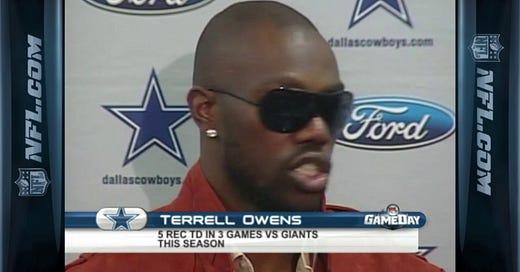


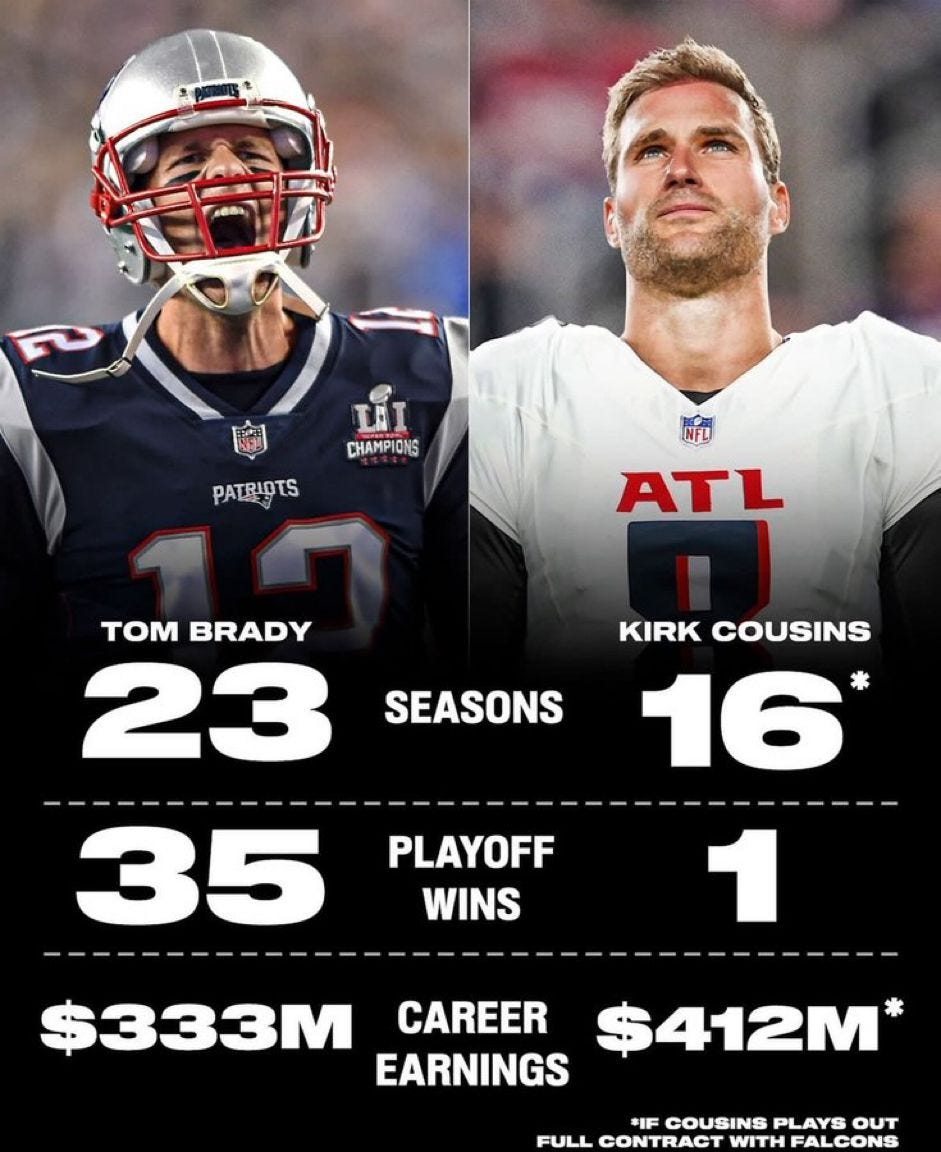
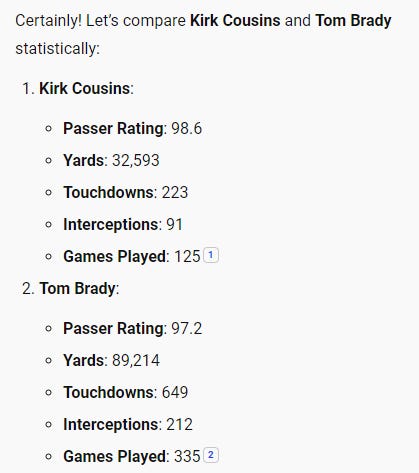









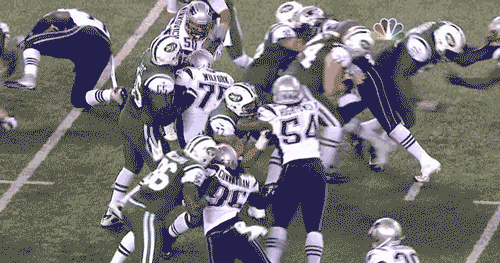
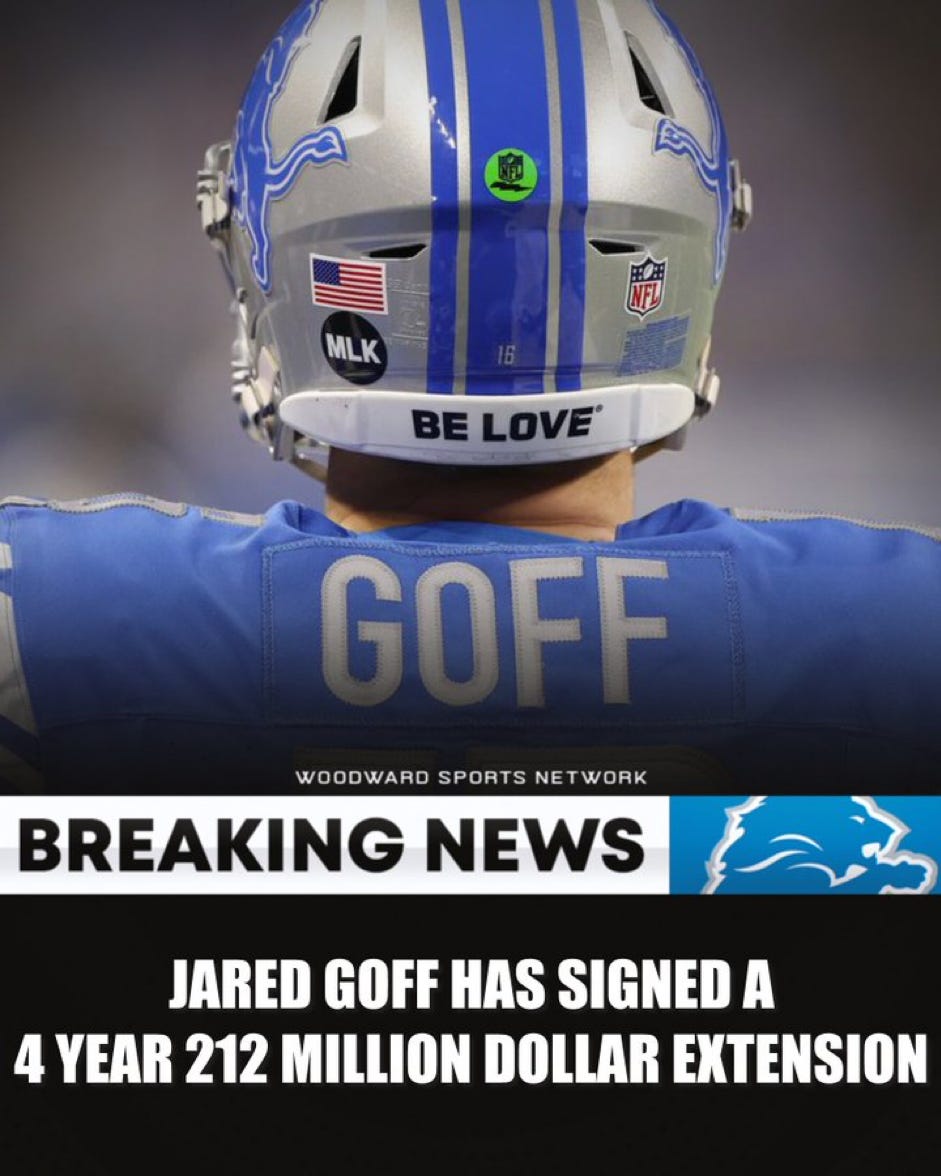

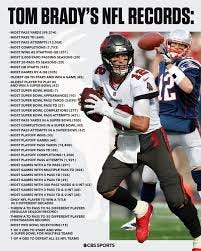
great article Darren with the NFL analogy-I never was a big fan of Caleb Williams (there were at least 3 QB's better than him in that 2024 Draft in my opinion-one from Michigan@!)